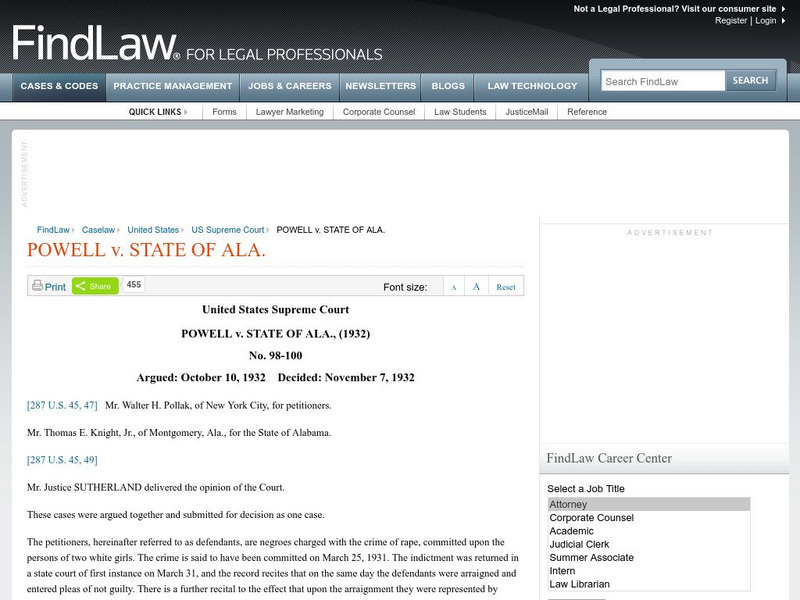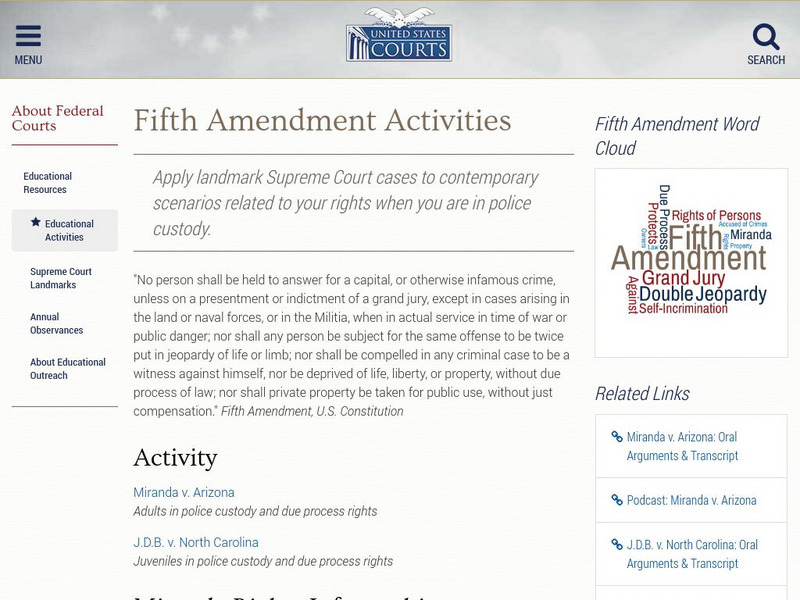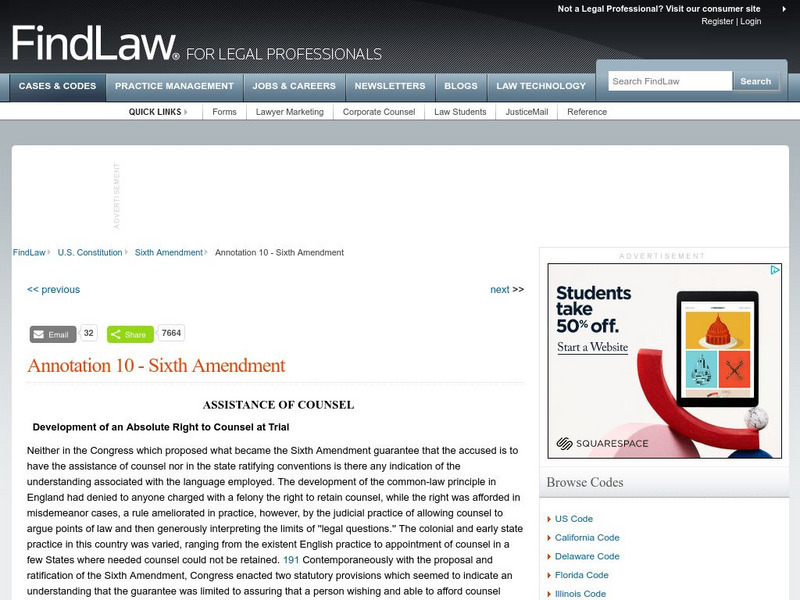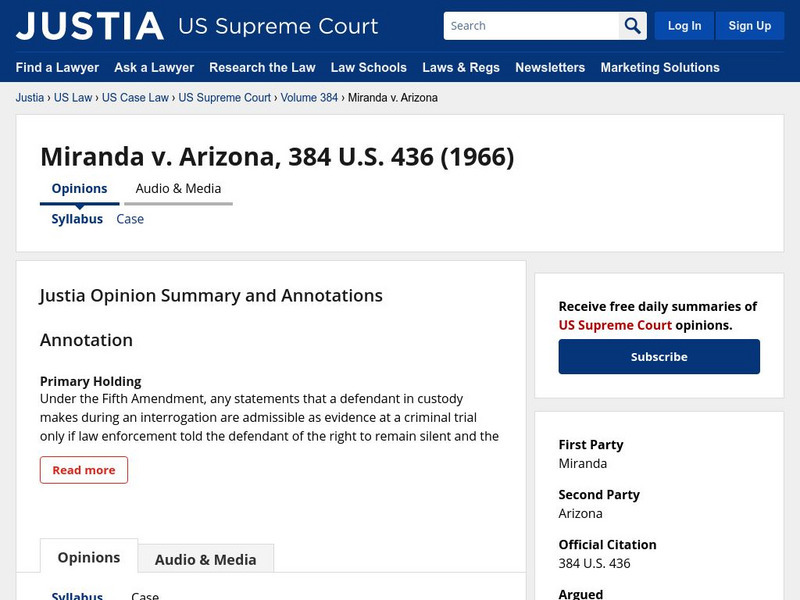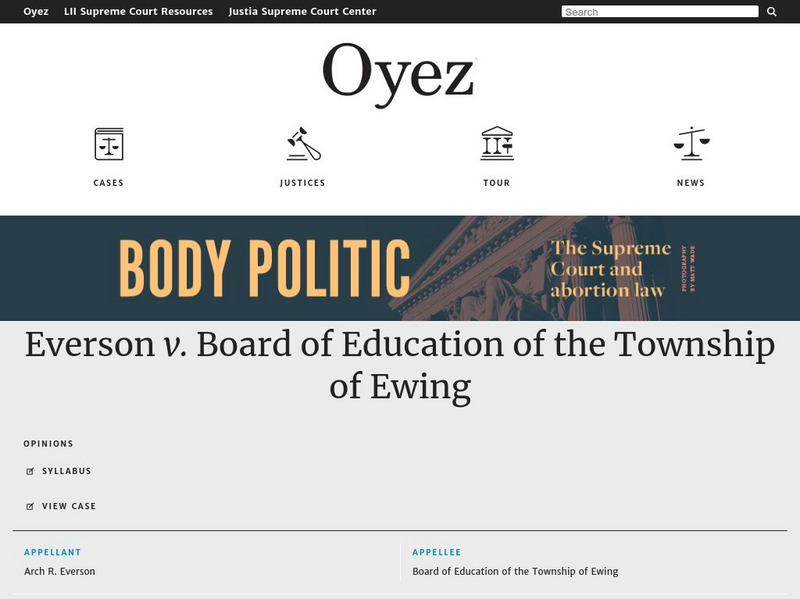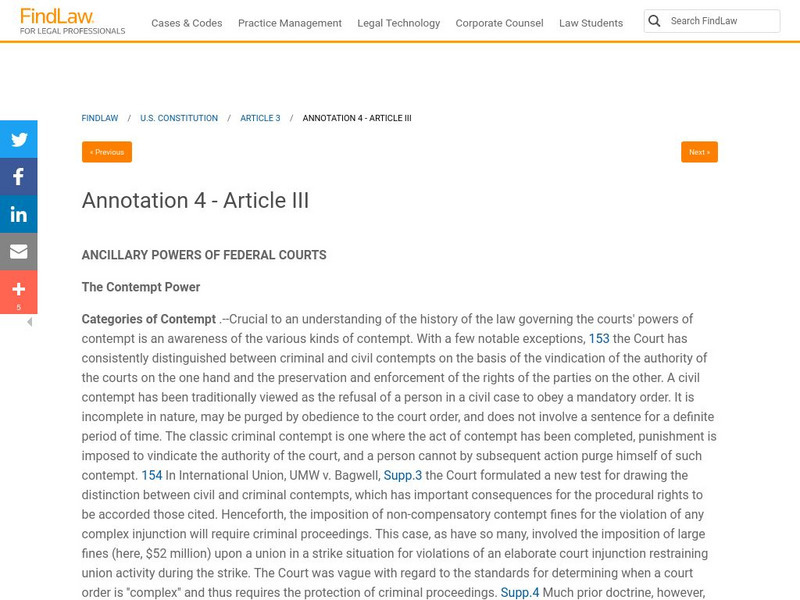Lectric Law Library
Lectric Law: Due Process
This resource presents a detailed description of the legal term "due process" with court cases cited.
Bill of Rights Institute
Bill of Rights Institute: Property Rights and the Supreme Court
A question over a piece of property owned by one, yet deemed protected by the EPA prompted a court case in search of due process and protection of property rights. Find out more about the case and the process through this lesson plan.
Thomson Reuters
Find Law: u.s. Supreme Court: In Re Gault (1967)
Full court transcript of 1967 U.S. Supreme Court case involving a juvenile, Gerald Gault.
PBS
Wnet: Thirteen: The Supreme Court: Landmark Cases: Miranda v. Arizona (1966)
PBS presents a summary of the landmark Supreme Court case of Miranda v. Arizona which ruled that a person suspected of a crime must be informed of their constitutional rights before police questioning, becoming known as the "Miranda...
Illinois Institute of Technology
Oyez.org: Oyez Directory
The OYEZ Directory offers hyperlinks to Supreme Court cases. Choose the topic you'd like to search under, like "Attorneys," or "Civil rights," for example.
Thomson Reuters
Find Law: u.s. Supreme Court: Powell v. Alabama (1932)
Features the full text of the opinion delivered by Justice Sutherland of the Supreme Court. This case involved the issue of due process of law.
Thomson Reuters
Find Law: u.s. Supreme Court: Gitlow v. New York (1925)
This Supreme Court case involved the subject of criminal anarchy. Read the complete text of the opinion delivered by Justice Sanford of the Supreme Court.
Cornell University
Cornell University: Law School: Powell v. Alabama
Provides the full text of the opinion of Justice Sutherland in the landmark Supreme Court case of Powell v. Alabama, which deals with the Fourteenth Amendment and due process of law, and which were found to be denied to the defendants in...
Syracuse University
Syracuse University: Youth Due Process Gerald Gault
This site contains a description of the juvenile justice system, background on the case involving Gerald Gault, and learning exercises for teachers to use in class.
Other
Us Courts: Fifth Amendment Activities
Two activities and lesson plan apply landmark Supreme Court cases on the Fifth Amendment and the right to due process or fair trial for adults and juveniles accused of a crime.
Thomson Reuters
Find Law: u.s. Supreme Court: Escobedo v. Illinois (1964)
A detailed description of the United States Supreme Court decision on the appeal of the case Escobedo v. Illinois, which ruled on the right to have counsel under the 6th and 14th Amendments to the Constitution.
iCivics
I Civics: In Re Gault (1967)
This mini-lesson covers the basics of the Supreme Court's decision that said juvenile offenders have a right to due process. Students learn about 14th Amendment due process, fairness, and the specific rights afforded juveniles in the...
CommonLit
Common Lit: Gault Case Changed Juvenile Law
A learning module that begins with "Gault Case Changed Juvenile Law" by Margot Adler accompanied by guided reading questions, assessment questions, and discussion questions. The text can be printed as a PDF or assigned online through...
Cornell University
Cornell University: Law School: Jurisdiction Explained
Site provides an overview of jurisdiction with links to recent case law and constitutional references.
Illinois Institute of Technology
Oyez: Gitlow v. New York
Brief resource presents the facts of the case, questions presented, and the conclusion of the Gitlow v. New York United States Supreme Court case.
Cornell University
Cornell University: Law School: In Re Gault (1967)
Presents the syllabus of the landmark Supreme Court case of In re Gault which decided that juveniles tried for crimes in delinquency proceedings should have the right of due process protected by the Fourteenth Amendment.
Thomson Reuters
Find Law: Annotation 10: Sixth Amendment: Assistance to Council
This article uses specific court cases to show how the right to counsel at trial was developed into the present day standard.
Boston College
Boston College: Gitlow v. New York
Complete syllabus and opinion of the Gitlow v. New York United States Supreme Court case.
Other
U.s. Supreme Court: Miranda v. Arizona, 384 u.s. 436 (1966)
A complete and in-depth history of the 1966 U.S. court case of Miranda v. Arizona.
Illinois Institute of Technology
Oyez: Everson v. Board of Education
Brief account of the Everson v. Board of Education Supreme Court case. Gives dates, facts, questions, and conclusion.
Other
The Alliance: Review of in Re Gault
This article provides an easily understandable description of the 1967 U.S Supreme Court case involving Gerald Gault.
Thomson Reuters
Find Law: Article Iii: Categories of Contempt
An in-depth look at the different types of contempt of court, in the United States legal system.
Illinois Institute of Technology
The Oyez Project: Gideon v. Wainwright
Includes hours of oral arguments on Real Audio, a link to case opinions, an abstract summary, and notes about the vote of each justice on the Gideon v. Wainwright decision. The 'Case Basics' links have documents and more information from...
TED Talks
Ted: Ted Ed: What Happened to Trial by Jury?
In the United States today, juries decide less than 4% of criminal cases and less than 1% of civil cases filed in court. At the same time, jury systems in other countries are growing. So what happened in the US? And could the...





